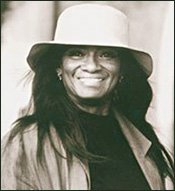Barbara Chase-Riboud Interview
February 17, 2010
HistoricalNovels.info interviews
the author of Sally Hemings
 Barbara Chase-Riboud's novel Sally Hemings (see review) shattered stereotypes about Thomas Jefferson and the slave woman who bore his children. First published in 1979, it's now available in a new edition from Chicago Review Press with an afterword almost as interesting as the novel itself (though it could never be as beautiful or touching). It was great to have Barbara visit the blog on February 17, 2010, to talk about Sally Hemings.
Barbara Chase-Riboud's novel Sally Hemings (see review) shattered stereotypes about Thomas Jefferson and the slave woman who bore his children. First published in 1979, it's now available in a new edition from Chicago Review Press with an afterword almost as interesting as the novel itself (though it could never be as beautiful or touching). It was great to have Barbara visit the blog on February 17, 2010, to talk about Sally Hemings.
Sally Hemings was originally published five years after Fawn Brodie's controversial 1974 biography of Thomas Jefferson, which proposed that all of the children of Sally Hemings were most likely fathered by Thomas Jefferson. How big a role did this biography play in the inspiration for your novel?
Contrary to popular legend, Brodie's 800-page psychological study had only a short chapter on Sally Hemings in which she merely raised the longstanding question of the Hemings relationship, posing the question but never asserting the relationship as fact. But the book was reviewed only on this aspect, and Brodie never recovered from the venom and accusations directed towards her. I believed the circumstantial and historical evidence in her book was sound and conducted my own investigations, convinced the relationship started in Paris where I reside. Brodie's review of my book said that I had taken the "big imaginative leap" that made the affair come to life.
In Sally Hemings, you write about a spiral staircase leading up from Jefferson's bedroom in Monticello to a narrow passageway above the room. Is that staircase fact or fiction?
Fact. This tiny staircase first came to my attention in the early 1970s when I discovered it in a National Geographic photograph from the 1930s. In the photo, it was built into the alcove behind a narrow door at the foot of Jefferson's bed. An accompanying caption wondered if the "mysterious" staircase led to a bodyguard's room overhead. Wanting to see it for myself, I took the public tour at Monticello, waited until the guide had left the room, and ran up the narrow steps to discover a brick passageway that led nowhere and looked down on the room below. I incorporated the staircase in my novel. In September 1979, after Sally Hemings was published in April, I returned to Monticello with a reporter and a photographer from People magazine. To my great surprise, the staircase was gone and in its place was a gaping hole. The stairway had been torn out the night of July third. The vandalism shocked me. I've written more about this staircase in the afterword to the new Chicago Review Press edition of Sally Hemings.
How did you feel when the DNA evidence emerged in 1998 showing that at least one of Sally Hemings's children was fathered by a man in the Jefferson family?
I felt, of course, vindicated after all the howls of denial and especially for Fawn Brodie, who had died in the meanwhile, in part because of the chagrin she experienced (we both did) around the attacks on the veracity of the story.
As a white woman, I would hesitate to write a novel in which a black character was a central figure. Yet you write very effectively about Thomas Jefferson, a white character who is one of the more complex and interesting figures in your novel, or any novel. What's your secret?
I don't write as a white or black woman; neither do I write about "white" or "black" characters. I write about human beings and the human condition, which is universal. Only the social details change. Human emotions and entanglements remain the same throughout history. I did hesitate to put words in the mouth of Jefferson that I didn't find in history books - anyone would. It took me four-fifths of the writing of the book to be able to do it with confidence.
Jefferson's political enemies vilified him for having sexual relations with his black slave. In our own time, numerous politicians have been accused of sexual misdeeds. Do you think these are legitimate issues in political campaigns?
I have always considered this relationship tragic - almost a Greek tragedy. Others have vulgarised it but it stands now, I believe, above this crassness. I believe a thirty-eight-year, seven-children relationship to be more than a sex scandal. As for sex and politics in the U.S., I believe sex, if it does not influence the working job of a politician, is his own business. Power is an extraordinary drug which goes to the head of both the great and the mediocre. You cannot punish one and leave the other free, and in our hypocritical and pseudo-puritanical society, historians do not dare to make a choice between the truly important and the trivial. Now that the DNA has resolved the question, historians are busy trying to make the tragedy into the trivial and once again push it into the secret unknown, but I doubt if the public will allow it.
Review of Sally Hemings by Barbara Chase-Riboud
See listing for Sally Hemings at Powell's Books
See listing for Sally Hemings at Amazon.com
Back to Directory of Author Interviews
Enjoy this page? Please pay it forward. Here's how...
Would you prefer to share this page with others by linking to it?
- Click on the HTML link code below.
- Copy and paste it, adding a note of your own, into your blog, a Web page, forums, a blog comment, your Facebook account, or anywhere that someone would find this page valuable.